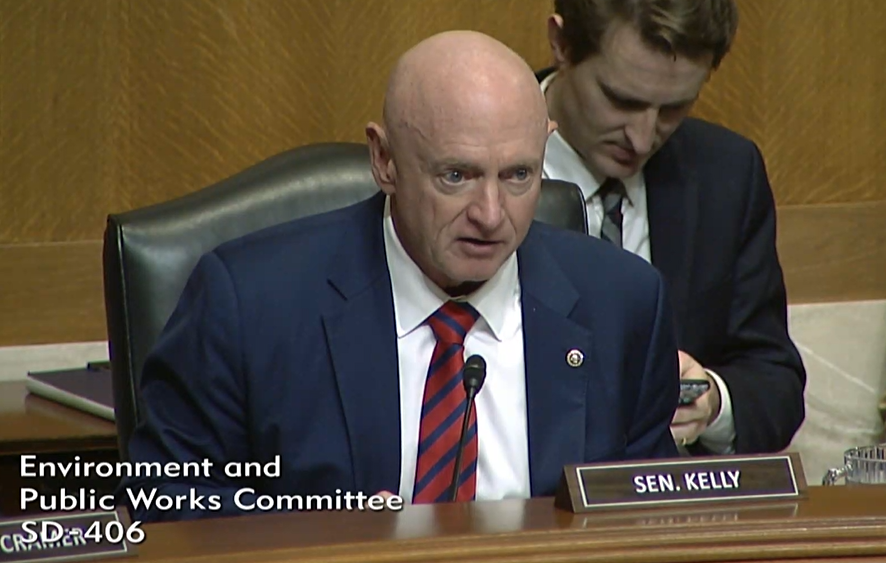WATCH: Sen. Kelly Chairs Senate Hearing on Roadway Safety
Kelly highlighted his bipartisan Truck Parking Safety Improvement Act
Today, Arizona Senator Mark Kelly chaired a Senate Environment and Public Works Transportation and Infrastructure Subcommittee hearing to examine how the Bipartisan Infrastructure Law is addressing roadway safety challenges, including rising traffic fatalities in Arizona.
During the hearing, Kelly discussed the unique safety challenges faced by rural and tribal communities and highlighted his Truck Parking Safety Improvement Act — bipartisan legislation to reduce traffic accidents and strengthen supply chains by increasing truck parking capacity and improving existing truck parking infrastructure.

Click here to download video of Kelly’s remarks. Click here to find the full hearing. See below for a transcript of his opening statement:
Sen. Kelly: The committee will come to order. I want to thank everyone for joining us today in the Transportation and Infrastructure Subcommittee for this hearing on roadway safety. I want to thank my colleagues, Senator Cramer, and his staff for their partnership leading up to this hearing, and his continuing partnership in leading this subcommittee. I also want to thank Chairman Carper, Ranking Member Capito, and their staffs for the work that they put in leading up to this hearing as well. And thank you to all of our witnesses for joining today and taking part in this hearing about the many ways that roadway safety challenges, and the challenges that we are facing today.
This is an important discussion. For decades, the trends, in terms of highway fatalities and injuries, was always going down, but that is no longer the case. Over the past decade, we have seen roadway fatalities again increase. And there are significant jumps in fatalities over the past three years. In 2021, the last year that we have complete data, nearly 43,000 Americans died in traffic accidents, and an estimated 2.5 million people were injured. Now, in some states, we have started to see the data look a little bit better, so that is a good thing. But that is not true across the board. In Arizona, for example, the preliminary estimates from the National Safety Council indicate that roadway fatalities are up 69% this year compared to last year.
These numbers alone deserve attention from this committee, but it’s important to dive deeper and understand how recent trends have contributed to different safety challenges across different transportation modes. For example, as our supply chains changed in three years after the pandemic, there has been more demand on goods moving by truck. Yet, this increased demand has presented a number of challenges to the industry, including workforce problems, supply chain bottlenecks at seaports, and a lack of available parking for long-haul truck drivers. And these trends have contributed to increased rates of accidents involving heavy trucks, which is a trend that we must address.
The Bipartisan Infrastructure Law, which this committee played a large role in crafting, took several steps to help address these trends. But I think we should go further. That’s why I worked with Senator Lummis to introduce the Truck Parking Safety Improvement Act, which would provide dedicated funding to increase truck parking capacity and expand existing infrastructure. I look forward to discussing our bill more with Brenda Neville from the Iowa Motor Truck Association, as I believe it addresses a range of safety challenges facing the heavy truck industry.
For example, it ensures that truck drivers park in safe, designated spaces, not on the side of roads, which is obviously dangerous to both the trucker and other drivers. It also makes our supply chains more efficient by ensuring truck drivers don’t need to conclude their days early to find a safe place to park or risk violating their hours of service. And it also helps to address broader safety and workforce recruitment trends. By ensuring a safe place to park for every truck driver, we help the industry attract a broader and more diverse driver cohort.
And trucking isn’t the only class of roadway users facing new safety challenges. Folks on bicycles, and pedestrians have faced serious roadway safety threats in recent years. In 2021 alone, nearly 7,400 pedestrians were killed, which is the highest number since 1981. I know that several of my colleagues on this committee, including Senator Fetterman and Senator Cardin, have been working on solutions to the threats to these vulnerable roadway users.
And I am glad that we’re joined by Karina Ricks, who has decades of experience working to build safer streets for all roadway users from her time working with the City of Pittsburgh, the Washington, D.C. Department of Transportation, and the Federal Transit Administration.
And I also hope to spend time at this hearing understanding the different roadway safety challenges faced in rural and tribal communities across the country. Most roadway fatalities happen to occur in rural areas. And in tribal communities, motor vehicle crashes are the leading cause of death. The safety challenges these communities face are very different from other communities. Often times, poor road conditions or a lack of funding for safety improvements put rural and tribal communities at a disadvantage. Solutions for these communities will look different than the solutions needed in urban areas.
And I am glad that Karin Mongeon is joining us today as well to discuss how to address the unique challenges faced in these rural and tribal communities. Thank you for being here. So, I look forward to getting into all of these topics and more with our three witnesses today, but for now let me turn to my colleague, Senator Cramer, for his opening remarks.
